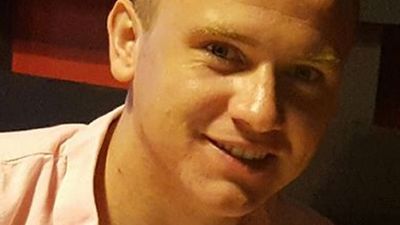Coroner calls for safety changes to prevent repeat of Suffolk airman Corrie McKeague bin death

A coroner has ordered reports into bin safety after an inquest found that missing Suffolk airman Corrie McKeague died after climbing into a commercial waste bin.
Corrie McKeague, originally from Dunfermline in Fife, was 23 when he disappeared in 2016 after a night out in Bury St Edmunds in Suffolk.
Nigel Parsley, the senior coroner for Suffolk, has sent a Report to Prevent Future Deaths (PFD) to four businesses - the British Standards Institute, The Container Handling Equipment Manufacturers Association, Dennis Eagle and Biffa Waste Services.
At the inquest into Mr McKeague's death in March this year, the Suffolk coroner voiced concerns that there was an "ineffective search" of the bin that the airman is believed to have climbed into to sleep in the early hours.
A coroner has the legal power to write a report following an inquest to people or organisations that they believe are in a position to take action to reduce the risk of a death occurring in similar circumstances in the future.
Recipients of the report must reply in 56 days detailing the action they intend to take.
The jury inquest into the death of Mr McKeague, who was stationed at RAF Honington, heard he had slept in bins before the night of his disappearance.
He had also slept under bin bags on a previous night out, using them "like a blanket", and was a "heavy sleeper" when drunk, the hearing was told.
CCTV footage last pictured Mr McKeague walking into an area behind some shops in Bury where there were several commercial-sized bins.
One of those bins, when collected that morning, was believed to have weighed significantly more than normal, leading the coroner to believe that Mr McKeague could have been in the bin.
The inquest heard evidence from a Biffa representative that over a period of six years there had been 740 incidents of people in bins.
The concerns listed in the Prevention of Future Deaths reports are: ineffective bin locks, ineffective search of the bin, a driver not having the means to search the bin throughly or safely; and poor visibility through the perspex viewing window on the lorry.
The locks were described as "not robust" and "due to their design the locks were also frequently broken", the inquest heard.
The coroner said if stronger locks were fitted, the number of reported incidents of people in bins - currently around 10 a week - was likely to be reduced.
In reference to the poor visibility, he said that it was physically impossible to undertake a check of the hopper mechanism on the Biffa lorry as the viewing window was too high.
On the six-year-old vehicle involved in Mr McKeague's disappearance, the perspex had become opaque.
Craig Knightley, the solicitors representing the family, said: "The family are grateful for the diligence of the jury, who heard extensive evidence over two weeks before coming to their conclusion.
"The fact that there were more than 740 incidents of people in bins in a six-year period with the obvious and significant risks, including fatality, indicate that this was a tragedy waiting to happen.
"The family would like to thank for coroner for not only his compassion throughout the inquest but in preparing the PFD reports.
"They genuinely hope that the raising of these concerns at the highest level will lead to changes within the industry and hopefully further reduce the serious risk to people in bins."
The driver of the lorry had told the inquest that he checked the contents of the bin before tipping it into the truck, and that the airman was not there.
The force said the movement of Mr McKeague’s mobile phone mirrored the movement of the waste lorry that collected the bin from the service area where he was last seen.
Mr McKeague was not seen on CCTV leaving the area on foot.
A Home Office pathologist explained that had Mr McKeague been tipped into the bin, he would been crushed or suffocated within minutes, and may not have known anything about it.